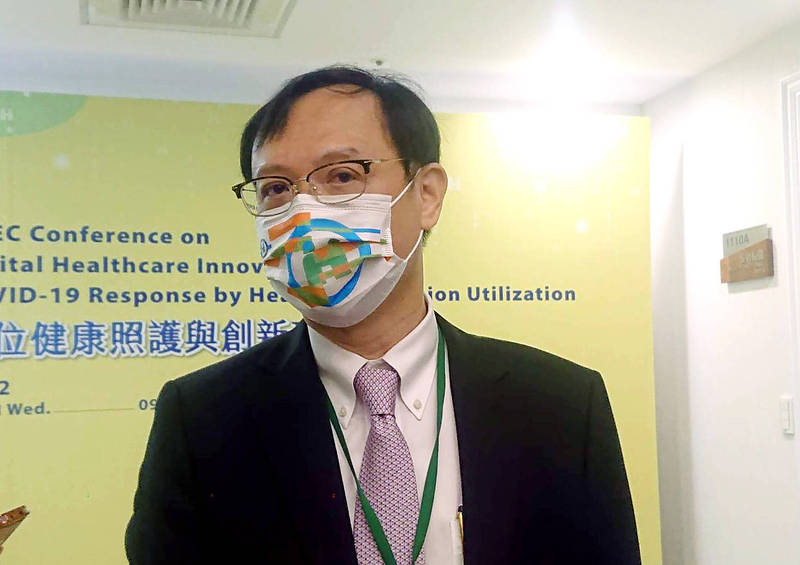《TAIPEI TIMES》APEC healthcare meeting opens

Deputy Minister of Health and Welfare Shih Chung-liang speaks to reporters outside the APEC Conference on Digital Healthcare Innovation in Taipei yesterday. Photo: CNA
TELEMEDICINE FOCUS: An official touted Taiwan’s use of digital technology, saying that talks should be held on how to better utilize big data to improve healthcare
By Lee I-chia / Staff reporter
The APEC Conference on Digital Healthcare Innovation opened in Taipei yesterday, with representatives from 12 of the 21 APEC member economies expected to take part in the two-day event being held by the National Health Insurance Administration (NHIA).
The agency has received US$75,000 from APEC to host the conference.
The conference is themed “COVID-19 Response by Health Information Utilization,” and features lectures, panel discussions and poster sessions. Some foreign participants would also visit Taipei Medical University Hospital today.
The event’s four main topics are: Digital transformation of healthcare and related innovations during the pandemic; new health policies and challenges in the post-pandemic era; telehealth and the future for hospitals; and bringing artificial intelligence to healthcare.
NHIA Director-General Lee Po-chang (李伯璋) at a dinner on Tuesday said that about 600 people had registered to attend the conference in person or online, including 278 people who would be participating in Taipei.
It is the first in-person large-scale international conference held by the Ministry of Health and Welfare since the COVID-19 pandemic began, the NHIA said.
“The conference is a useful platform for us to share our experiences promoting digital healthcare in Taiwan and to exchange ideas with the international community,” Lee said.
The NHIA last month launched a book titled Digital Health Care in Taiwan — Innovations of National Health Insurance, published by Springer Publishing, he said.
It is the first English-language book introducing the National Health Insurance (NHI) system in depth, including its history, income strategy, payment structure, policies, medical information system and other aspects, he added.
The book is available in physical and open-access electronic form, which has been downloaded more than 47,000 times since its launch, he said.
The NHI system involves a comprehensive database that has accumulated more than 70 billion medical records and more than 3.4 million medical images collected from Taiwan’s population, the NHIA said.
Providing parts of the anonymized data for research purposes has greatly benefited Taiwan’s healthcare policies and technology innovation, it said, adding that the data were also used for COVID-19 prevention.
“Digital technology facilitates the fast transmission and integrated use of healthcare data, bringing new prospect to smart healthcare,” Lee said. “Through international cooperation, we wish to discuss how we can better utilize big data to improve people’s health and welfare.”
“As this could also create business opportunities, it also meets APEC’s goal of supporting economic growth and prosperity in the region,” he said.
Healthcare providers and the public had been unfamiliar with telehealth, but that rapidly changed during the pandemic, as many people were diagnosed with COVID-19 and were prescribed antiviral drugs through telemedicine, he said.
Deputy Minister of Health and Welfare Shih Chung-liang (石崇良) told reporters on the sidelines of the conference that the Department of Medical Affairs has proposed revising the Rules of Medical Diagnosis and Treatment by Telecommunications (通訊診察治療辦法).
The revision plans to expand eligibility for receiving a prescription through telemedicine, Shih said.
Eligibility would be expanded from five categories of patients to 10, he said.
The new categories are people with chronic diseases in a steady condition; people in hospice care and long-term care residents; social welfare recipients; inmates; and people in need of urgent care, such as for COVID-19 or other infectious diseases, Shih said.
The draft revision might be presented next month and promulgated in December to take effect on Jan. 1 next year, he said.
The revision was proposed in light of the public’s increased familiarity with telemedicine and improvements in infrastructure, Shih said, adding that more than 98 percent of recent COVID-19 cases received healthcare through telemedicine.
If the revision is passed, the NHIA would upgrade the NHI system, including by promoting its digital NHI card and establishing an online NHI co-payment system, to make telemedicine more convenient for healthcare providers and patients, Lee said.
新聞來源:TAIPEI TIMES















